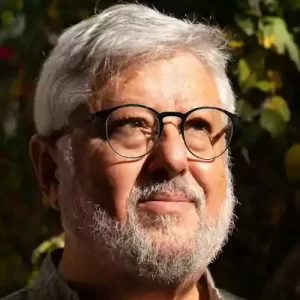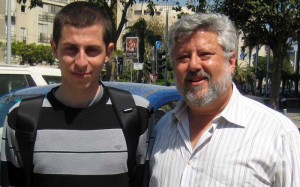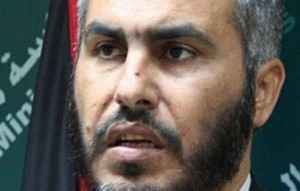here are the main points of the interview
? “There is no example in history where 240 civilians were held captive”
? “The only way for them to be released is to make an agreement with Hamas”
? “Jabaliye camp attack is a war crime”
? “Hostage videos affect negotiations”
? “Hamas and ISIS have two different structures”
? “The people are divided over the hostages issue”
“I would like to take part in the hostage crisis if the government wants, but I don’t think they will consult me”
That’s what Gershon Baskin says.
Baskin, founder and former president of the Israel/Palestine Research and Information Center.
Journalist and peace activist…
Those who follow him for years know that he is a name that is based on the two-state, two-people solution and has devoted himself to the solution of the Israeli-Palestinian conflict.
He is also a columnist for The Jerusalem Post newspaper.
Another feature of his is his mediation in the process of releasing Israeli soldier Gilad Shalit, who was captured by Hamas in 2011 and held in the hands of Hamas for more than five years…
Israeli peace activist Gershon Baskin was one of those who sat at the negotiating table for the release of Israeli soldier Gilad Shalit, who was freed from Hamas captivity in 2011 / Photo: Gershon Baskin ArchiveAs the Gaza War moves into its first month, I spoke with Gershon Baskin.
Baskin talked about the situation of more than 200 people taken hostage by Hamas in its attack on October 7, psychological warfare, Israel’s heavy bombardment of the Gaza Strip, and the impressions of Israeli society on what was happening.
According to Baskin, the state of Israel is committing a war crime, Hamas’s actions on October 7 are terrorism, and perhaps for the first time in history, there was an incident in which more than 200 civilians were taken hostage, but no matter what, the two sides should talk.
“Jabaliya camp attack is a war crime”
Israel’s attack on the Jabaliya refugee camp is one of the most important developments in recent days. Many civilians lost their lives in this attack. I would like to start the conversation with this issue. Do you think this is a war crime?
I think yes, this is a war crime. Bombing a neighbourhood with the intention of killing a Hamas commander is a war crime, yes.
Maybe you’ve heard of Craig Mokhiber. He was director of the New York office of the Office of the High Commissioner for Human Rights. He said that there was genocide in Gaza and resigned. Do you agree with him?
Look, I checked the international legal definition of genocide. What Israel is doing in Gaza is terrible, but when combined with all the civilian deaths, it does not meet the definition of genocide. Because genocide is mostly a strategy, a plan to eliminate the existence of a people. And that’s not what’s happening in Gaza.
There are no gas chambers or execution chambers. The Israeli army does not openly enter with the intention of killing every Palestinian. Efforts are being made to limit civilian deaths. But frankly, when heavy bombs are dropped on communities, there are many civilian casualties. Some of these are war crimes, some are not… They certainly have catastrophic effects on the civilian population, but they are not genocide.
“The only way to release all hostages is to make an agreement with Hamas”
As far as I know, you have not had any official negotiating authority regarding the captives since October 7, but you have been in communication with both parties throughout the process. Is it possible to reach a long-term agreement, is there still hope? Because, as you put it, “The Israeli state has more responsibility to bring the prisoners home and time is running out.” Is time really running out?
I think there is no chance of a long-term agreement between Israel and Hamas. I think Hamas has lost its ability to govern the Palestinian people or to be a partner in any understanding with the state of Israel.
I also think Hamas is largely responsible for setting the Palestinian issue back 75 years. They bear responsibility for the events, they have been the government for 17 years and have managed to build hundreds of kilometres of tunnels just for their own fighters, but not a single shelter for their own people. I think the Hamas movement is committing war crimes against its own people. I hope that one day the Palestinian people will be wise enough to blame not only Israel but also Hamas, as has happened in other wars in world history… Regarding the hostages, there is only one way to release all hostages alive and that is to agree with Hamas … The price of this agreement is apparently the release of all Palestinian prisoners in Israel. According to the latest data, about 6 thousand people, including 559 people convicted of killing Israelis. Some of them received multiple life sentences for killing many Israelis. There are also 130 terrorists who crossed the border on October 7 and killed Israelis. They were captured by Israel. Also, this agreement includes very few Hamas and Islamic Jihad members. Almost all the people are from the West Bank… Of the 6,000 captives, only about 300 are from Gaza.
Many of them are being sentenced for membership in a terrorist organization or smaller crimes such as throwing stones at soldiers or throwing Molotov cocktails. Not all of them are murderers and not all of them can be described as terrorists. The big question is; Is this agreement being made? So is Hamas willing to release all the hostages at once? And will it be in response to the simultaneous release of all captives? The second question is where the prisoners should be released. Israelis say, “If we release them in the West Bank, it will be a danger to everyone living in Israel and the settlers in the West Bank.” If they release them into Gaza, maybe Israel will then move to kill them, I don’t know… In any case, I’m not sure how seriously this issue is being considered by the Israeli government. I’m not sure whether Hamas is seriously considering this offer either. Of course, if there is an offer on the table… This is a big dilemma for the Israeli government. If the hostages are not released through negotiations, Israel says the hostages are being held in the tunnels.
This means there will be a war between Israeli commandos and Hamas fighters. Any method by which the Israelis seek to extract Hamas members from the tunnels will endanger the lives of the hostages. We cannot expect any heroic rescue operations. We already saw one for a hostage. However, there are still an estimated 240 hostages there (in Gaza). Sick and injured people, including babies, children, women and the elderly… These are not soldiers, and even the soldiers who were kidnapped before were not warrior soldiers. They were at their base for the weekend. So this was not an army versus army war. On October 7, it was an attack by terrorists who terrorized civilian communities and massacred people at a music festival.
“There is no example in modern history where 240 civilians were held hostage”
So what makes today’s hostage crisis different from others is that it occurred during a full-scale war and there were civilian hostages…
There are a few differences. I think there is no precedent in modern history where an estimated 240 civilians, including babies, children, women and the elderly, have been held hostage. This is my opinion.
And they even took Thai workers as hostages. They killed 10 Nepali caregivers while crossing the Israeli border. Why are we covering the 10 Nepali caregivers Filipino caregivers or Thai workers killed by Hamas terrorists as part of today’s conflict?
“Currently, Israeli society supports the agreement to release all hostages”
I would like to ask a question about your personal history. A little bit about Prime Minister Netanyahu’s past… You played an important role in the release of Gilad Shalit. When he was released in 2011, Netanyahu was again in the prime minister’s chair. Historical records indicate that Netanyahu’s older brother, Yonatan Netanyahu, died in a hostage rescue operation carried out by Israeli Special Forces in 1976. Your husband’s cousin was kidnapped and killed by Hamas in 2005. As part of the negotiation you held during the Shalit period, the four people responsible for the death of your wife’s cousin were also released as part of the agreement. It is even claimed that one of these people was one of the leaders of the October 7 attack. My question is: How did you personally feel during this period? And how does Netanyahu view the hostage crisis from his perspective?
The person you mentioned died in the first night of the war.
Yes…
So, do you also talk to Gazi Hamad? Because he, along with you, played a role on behalf of Hamas in the process of Shalit’s release…During the Shalit negotiations, what I felt on the day Gilad Shalit returned home in October 2011 was the feeling of “I could not save my wife’s cousin, but Gilad returned home alive.” It was a great feeling to feel that I had something to do with saving a young man’s life. I did not vote on the agreement. They didn’t ask for my opinion. At the time, 26 members of the Israeli government supported the agreement. This suggested that the government, including Netanyahu and all national security units, accept the agreement.
They supported the agreement, including the police chief, army chief, Mossad chief and Shin Bet chief, and told the Israeli government to support it. Because even if it was a bad deal, it was the only way to bring Gilad Shalit home. At the time, it was widely thought that leaving no one behind was the basis of a people’s army. So they decided to do something very risky, very dangerous and difficult for the people of Israel. But I would still say about 80 to 85 per cent of the public supports it. Immediately after the October 7 attack, it was clear that the entire Israeli population wanted them to enter Gaza with a large force, kill all Hamas leaders and military commanders, and eliminate Hamas’ ability to threaten Israel.
Graffiti demanding the release of Israelis held hostage by Hamas in Gaza, Haifa, northern Israel, on October 27, 2023 / Photo: Shir Torem
Over the past three weeks, we have seen photos of hostages and heard their stories from their families, their siblings, and the horrific terrorism in Israel. I can say that right now most of the Israeli society supports the agreement to release all the hostages, all the prisoners. This does not mean it will be approved. This does not mean that the government will vote for this and say “Yes”. It doesn’t even mean that Hamas is seriously proposing this. My contacts with Hamas have stopped for the last four days. I do not know why it happened. Maybe because the negotiations are so serious. Or it could be because it has absolutely no bearing on what is and what isn’t. Because the real decision makers are those who make the final decision on the type of agreement Al Qassam will make inside the tunnels in Gaza. He is not someone like Ismail Haniyeh or Razi Hamid, who fled from his people before this war and lived in five-star hotels in Beirut. I don’t know what’s going on in the negotiations. I don’t know what the Israeli government will decide. I think the decision should be made within hours and days. Not weeks…“Hostage videos affect negotiations”
He stopped talking to me four days ago. He did not contact me.
I understand. As you say, Hamas is publishing hostage videos. Finally, three Israeli women say they are hostages and turn to Israeli Prime Minister Netanyahu and say, “Release us now.” Is propaganda the most effective weapon in such situations? How does psychological warfare affect hostage negotiations and actions?
It has an extremely big impact. Everything that is done around the negotiations, like these videos, the re-releases of the videos, the statements made by members of the Israeli government… It’s all part of the negotiations. A slow, calculated attack on Gaza is part of negotiations with Hamas to exhaust any possibility of finding a way forward before rescuing the hostages. The military is still planning hostage rescue operations, thinks anything is possible, and if it thinks there is a chance of saving the hostages, it will do them. That kind of video of three women has a potent impact on Israeli society. On the other hand, if Hamas produces another type of video, that is, an ISIS-style video executing hostages, it would have the opposite effect on Israeli society. The determination of Israeli society will be to go faster and with more force to kill all Hamas leaders and the military wing of Hamas. Things may also get out of control and they may try to use propaganda against them. However, this may be propaganda that will work against them.
“Hamas and ISIS have two different structures”
Is Hamas the same as ISIS, as the Israeli government says?
N
o. Hamas and ISIS are two different movements with different goals and different structures. And I can talk about all of these differences. What I can say is that what Hamas is doing in Israel is in line with the ISIS handbook. In many ways, they became ISIS by the things they did inside Israel. And I can say that they are detaining civilian hostages, children, women and old people. This is against both the Quran and Islam, and goes against what Hamas has long believed. They always claim that they are fighting against soldiers, fighting against the army, and what they are doing is against their religious beliefs.
In other words, they acted like ISIS and became like ISIS. However, there are still many differences between ISIS and Hamas. Hamas is the political national liberation movement of Palestine. He is Islamist. However, their goal is not to convert the world to Islam and bring Dar al-Islam to the entire universe. Their target is Palestine. They did not apply Sharia law. They maintained civil law throughout the 17 years of their rule in Gaza. They are a conservative movement. They have conservative Islamic values. They do not accept liberals accepted in the West. They do not tolerate homosexuality and reject any easily accepted social norms in the West. They also do not allow their opponents. They treated people cruelly. There was a movement in Israel called “We Want to Live in Gaza” and they eliminated them. They are not a democratic movement. They are not liberal and this is similar to ISIS. But ISIS was made up of different people from all over the world, including non-Muslims, drug addicts and criminals. Hamas is not like that. The majority of Hamas are Palestinians who have suffered from conflict and occupation and have lost family members and homes. They are people devoted to Allah, Islam, Al Aqsa and Palestine, and people who want to take revenge.
“Both the USA and Israel are considering Qatar for hostage negotiations”
In an article you wrote for the New York Times, you stated that Israel, Qatar and Hamas should engage in direct talks, and no one else. Are you suggesting that the United States or any other actor should not intervene in this process?
I think the best negotiations that occur in any conflict situation are when enemies negotiate directly with each other. It is clear that Israel does not want to talk to Hamas and Hamas does not want to talk to Israel. That’s why third-party mediators are needed. There are two main parties involved: Qatar and Egypt. The USA is there to put pressure on Qatar. It has an impact on Qatar. I think they’re not using all the influence they have, and I think they should. Qatar makes an effort. Recently, the Qatari government released a statement explaining that they are not a state that supports Hamas and terrorism. I think differently. I think Qatar is a state that supports terrorism. Harboring Hamas over the years is a form of supporting terrorism.
Financing Hamas with more than $1 billion over the years is supporting terrorism. And the USA has interests there. The largest military base in the Persian Gulf is located in Qatar, but more pressure must still be applied. I personally believe that Egypt can negotiate with Hamas better than Qatar, but it seems that both the Israelis and Americans are mostly putting their weight behind Qatar to conduct these negotiations.
“Erdogan took a clear stand against Israel and rendered himself ineffective in mediation.”
If Turkey had maintained a balanced policy at the beginning of the Gaza War, could it have played a mediating role regarding the prisoners?
In the first week of the war, when I was asked, I mentioned three states that could potentially mediate. These were Qatar, Egypt and Turkey. Turkey is also in an interesting position because it is home to hundreds of Hamas families, and this is leverage that Turkey could use on Hamas, if Turkey wanted to… However, Turkey’s President is trying to take a clear stance against Israel and that Hamas is a terrorist organization. He decided to declare that he was not, thus making himself ineffective in mediating this conflict process.
Moreover, he (Erdogan) worsened the relations between Israel and Turkey at a time when they were on the road to improvement, and now relations are back to one of their lowest points. This is a sad situation. I have visited Turkey for years. I have been to Turkey more than 200 times. We organized Israeli and Palestinian meetings in Turkey for years. During the Second Intifada, in 2003, when it became impossible to organize Israeli and Palestinian meetings here, I went to Turkey every weekend with groups of Israelis and Palestinians. I miss Turkey.
“The public is divided over the hostages issue”
You mentioned it briefly, but how do the Israeli people view the Palestinian prisoners who were released in exchange for hostages? Can you give more details? We can observe a level of anger through the Israeli press. How do you interpret the current situation?
We do not currently have definitive polls about the views of the Israeli public. Therefore, what I say is my impression, not based on data , just my impression. My impression is that there are very strong views on both sides of the debate. There are Israelis who have very strong views against ever surrendering to Hamas or even releasing a single Palestinian prisoner. On the other side, there are very strong and vocal people who say that Israel should bring back the hostages at all costs and that we should release all the prisoners. There are very few people who are clear on this issue. There are those who say, “Either make the deal now and bring the hostages home” or “We should not release all the prisoners” or even “We should not release even a single prisoner.”
I don’t think there is a clear majority on this issue, the people are divided in this situation and I don’t know what the Israeli government is thinking. People are not completely divided in this situation. They are not divided between right and left, or between those who support Netanyahu and those who oppose Netanyahu. There is a different discussion on this subject. The people are completely united behind the people in the consequences of the war. However, they think Hamas should be overthrown, and there is no distinction between left and right on this issue. The Israeli government overwhelmingly stands behind the decision that this war should not end unless Hamas’s ability to rule Gaza and threaten Israel ends.
“I accept a duty, but the government does not offer it”
So, if the Israeli government gives you any assignment regarding this hostage crisis, would you accept it?
Of course I would accept it if they ask, but I don’t think they will ask.
Published originally on Independent Turk at
and
https://twitter.com/i/status/1720016194399359402
and





